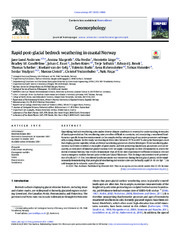Blar i forfatter "Faust, Johan Christoph"
-
Biogeochemical consequences of a changing Arctic shelf seafloor ecosystem
März, Christian; Freitas, Felipe; Faust, Johan Christoph; Godbold, Jasmin A.; Tessin, Alyson; Abbott, Geoffrey D.; Airs, Ruth; Arndt, Sandra; Barnes, David K.A.; Grange, Laura; Gray, Neil; Head, Ian M.; Hendry, Katharine R; Hilton, Robert; Reed, Adam J.; Ruhl, Saskia; Solan, Martin; Stevenson, Mark A; Tait, Karen; Ward, James M.; Widdicombe, Stephen; Souster, Terri A. (Journal article; Tidsskriftartikkel; Peer reviewed, 2021-10-09)Unprecedented and dramatic transformations are occurring in the Arctic in response to climate change, but academic, public, and political discourse has disproportionately focussed on the most visible and direct aspects of change, including sea ice melt, permafrost thaw, the fate of charismatic megafauna, and the expansion of fisheries. Such narratives disregard the importance of less visible and ... -
Does Arctic warming reduce preservation of organic matter in Barents Sea sediments?
Faust, Johan Christoph; Stevenson, Mark A.; Abbott, Geoffrey D.; Knies, Jochen; Tessin, Allyson; Mannion, Isobel; Ford, Ailbe; Hilton, Robert; Peakall, Jeffrey; März, Christian (Journal article; Tidsskriftartikkel; Peer reviewed, 2020-08-31)Over the last few decades, the Barents Sea experienced substantial warming, an expansion of relatively warm Atlantic water and a reduction in sea ice cover. This environmental change forces the entire Barents Sea ecosystem to adapt and restructure and therefore changes in pelagic–benthic coupling, organic matter sedimentation and long-term carbon sequestration are expected. Here we combine new and ... -
Environmental response to past and recent climate variability in the Trondheimsfjord region, central Norway - A multiproxy geochemical approach
Faust, Johan Christoph (Doctoral thesis; Doktorgradsavhandling, 2014-07-04)Norwegian fjords have a great potential for providing high-resolution sedimentary records that reflect local terrestrial and marine processes and therefore, fjords offer unique opportunities for the investigation of sedimentological and geochemical climatically induced processes. However, the complexity of fjord systems in terms of bathymetry and oceanography requires a profound knowledge of the ... -
Geochemical characterisation of northern Norwegian fjord surface sediments: A baseline for further paleo-environmental investigations
Faust, Johan Christoph; Scheiber, Thomas; Fabian, Karl; Vogt, Christoph; Knies, Jochen (Journal article; Tidsskriftartikkel; Peer reviewed, 2017-08-26)Norwegian fjord sediments are promising archives for very high resolution records of past environmental changes. Recent investigations of the modern depositional environment within fjords revealed that the accurate quantification of the inputs, sources, and sedimentary preservation of organic and inorganic material is crucial to decipher long term past climate signals in the sedimentary record ... -
Organic Matter Sources in North Atlantic Fjord Sediments
Faust, Johan Christoph; Knies, Jochen (Journal article; Tidsskriftartikkel; Peer reviewed, 2019-05-31)To better constrain the global carbon cycle fundamental knowledge of the role of carbon cycling on continental margins is crucial. Fjords are particularly important shelf areas for carbon burial due to relatively high sedimentation rates and high organic matter fluxes. As terrigenous organic matter is more resistant to remineralization than marine organic matter, a comprehensive knowledge of the ... -
Rapid post-glacial bedrock weathering in coastal Norway
Andersen, Jane Lund; Margreth, Annina; Fredin, Ola; Linge, Henriette; Goodfellow, Bradley W.; Faust, Johan Christoph; Knies, Jochen; Solbakk, Terje; Brook, Edward J.; Scheiber, Thomas; van der Lelij, Roelant; Burki, Valentin Josef; Rubensdotter, Brita Lena Eleonor Fredin; Himmler, Tobias; Yesilyurt, Serdar; Christl, Marcus; Vockenhuber, Christof; Akcar, Naki (Journal article; Tidsskriftartikkel; Peer reviewed, 2021-10-26)Quantifying bedrock weathering rates under diverse climate conditions is essential to understanding timescales of landscape evolution. Yet, weathering rates are often difficult to constrain, and associating a weathered landform to a specific formative environment can be complicated by overprinting of successive processes and temporally varying climate. In this study, we investigate three sites ...


 English
English norsk
norsk




